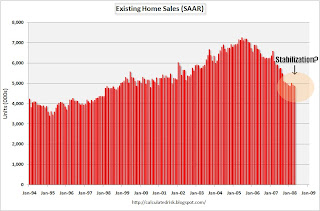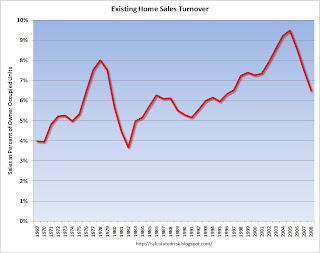by Calculated Risk on 6/13/2008 12:32:00 PM
Friday, June 13, 2008
Existing Home Sales: Turnover Will Slow
The foreclosure article this morning contained an estimate from Lehman economists on foreclosure sales this year:
Foreclosures will account for 30 percent of national home sales this year as 1.2 million foreclosed single-family homes will eventually enter the market, [Michelle Meyer and Ethan Harris, economists at Lehman Brothers] said.This is another reminder that the only reason existing home sales appear to have "stabilized" is because of the high number of REO sales. Sales excluding REOs have plummeted.
 Click on graph for larger image in new window.
Click on graph for larger image in new window. Here is a graph of existing home sales since 1994. Imagine how much further sales activity would have fallen without the significant REO activity.
Of course REO sales are real sales and should be included, but I suspect these REO buyers might hold these properties longer than recent turnover would suggest. If these are owner occupied buyers, they have probably been waiting to buy, and they have saved a down payment and qualified under the tighter lending standards. They probably won't sell until they can make a reasonable profit to buy a move up home - and it will probably be a number of years before prices recover.
If they are investors, they are likely buying REOs for cash flow - not appreciation, like the speculators in recent years - and these investors will probably hold the properties for a number of years too.
This suggests to me that turnover will slow further.
 The second graph shows existing home turnover as a percent of owner occupied units. Turnover for 2008 is the rate of the first four months of the year (just over 4.9 million units).
The second graph shows existing home turnover as a percent of owner occupied units. Turnover for 2008 is the rate of the first four months of the year (just over 4.9 million units).The turnover rate was boosted in recent years by:
Although slowing, the turnover rate is still above the median for the last 40 years (about 6% per year). Both types of speculative buying are over for now. And the Baby Boomers have probably bought move up homes, and the next major move will be downsizing in retirement (still a number of years away).
And finally - and probably the most important point - homeowners with negative equity, who manage to avoid foreclosure, will be stuck in their homes for years.
All of the above suggests the turnover rate will fall further.


